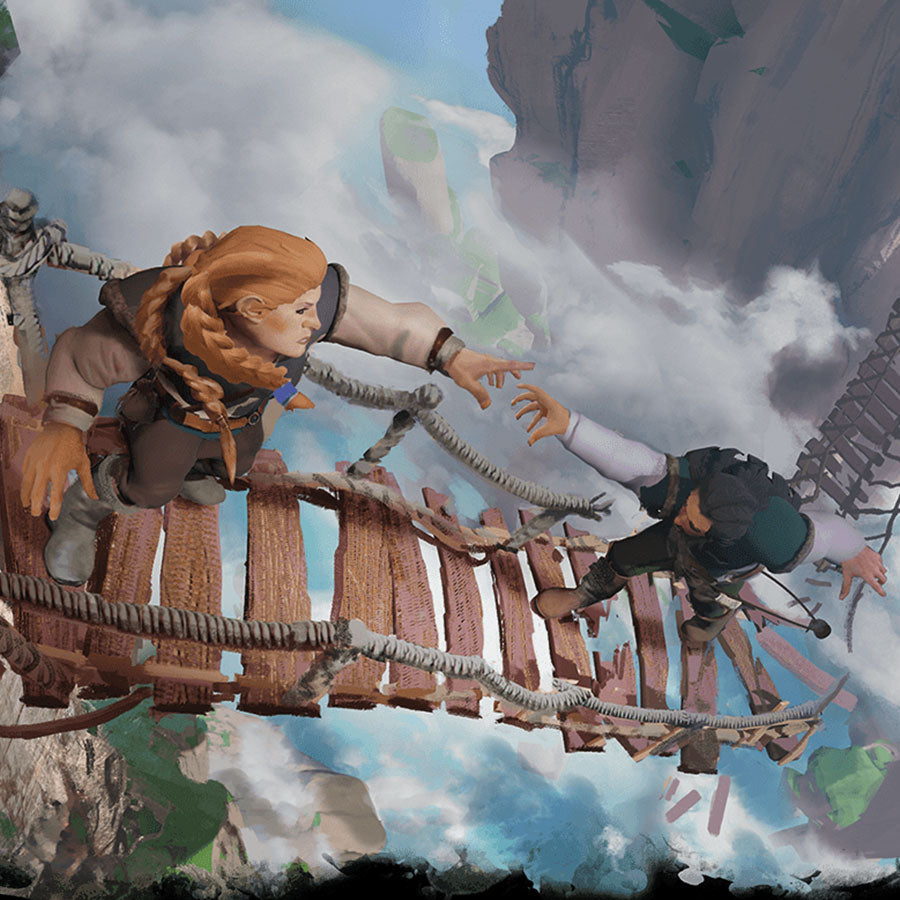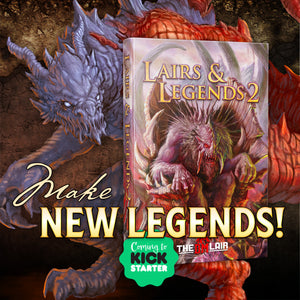The D&D Social Contract: What It Is, Why You Need One, and How to Use It

By Luke Hart
Today we’re diving into something far less glamorous than dragons, dungeons, or whether your rogue can seduce the barmaid… but easily just as important: the Social Contract in roleplaying games. We’re going to break down what the social contract actually means, why you should have one, what you should put in it, how to make it, and—most importantly—how to use it once it exists.
By the way, are you a NEW GAME MASTER feeling a bit overwhelmed by everything involved with running a role-playing game? If so, the Secret Art of Game Mastery can help. Get over 100 years of GM experience distilled into practical, easy-to-read advice.
Watch or listen to this article by clicking the video below.
What Is the Social Contract? (…There Are Two Kinds)
When people in RPG spaces say “social contract,” they’re actually talking about two different things.
1. The Unspoken Social Contract
This is the invisible agreement most of us naturally assume when we sit down to play:
- The Game Master will create a game for the players to play.
- The players will… play that game. Meaning they will not ignore adventure hooks, wander off aimlessly, sabotage the session, or spend 3 hours trying to build a casino in Waterdeep instead of following the actual plot.
If either half of this breaks down—DM not preparing a game, or players refusing to engage—nobody has fun. The campaign suffers. Everyone is frustrated. And the game eventually collapses.
2. The Written Social Contract
This is the more structured, explicit version—something you actually write down. This covers:
- Boundaries
- Expectations
- Responsibilities
- And group-specific rules
Basically: what’s allowed and not allowed at the table and how everyone is expected to behave.
Today we’re deep-diving into this version.
Why We Might Need to Write These Things Down
Once upon a time (not long ago), many of us assumed certain topics didn’t need to be spelled out:
- Graphic sexual content?
- Rape?
- Explicit violence against children?
Most of us just knew these didn’t belong in an RPG. These aren’t “boundaries”—they’re common sense. Unfortunately… common sense is becoming less common.
And on the other extreme, we also now have folks who melt down over even the tiniest perceived offense, which means navigating group comfort levels has become more complicated.
So yes: in today’s world, you probably should have a written social contract.
But more importantly, many issues worth discussing aren’t moral issues—they’re preferences:
- Are we sharing dice or not?
- Are electronics allowed at the table?
- Do we roleplay romance?
- Is PvP allowed?
These aren’t moral dilemmas—they’re simply things worth clarifying up front.
The Social Contract Isn’t Your Excuse for Bad Behavior
If you screw up at the table, own it. Apologize. Fix it.
Do NOT say:
“Well… we never established that in the social contract.”
No.
You messed up. That’s on you.
The social contract is not a legal shield. It doesn’t give you permission to act like a sleazeball until someone explicitly tells you not to.
You are still expected to be a good human being.
What to Include in a Social Contract
Every group is different—you won’t find a universal template. But here are the core pillars and the questions each covers.
1. Boundaries
These are the topics people do not want in their game. Examples:
- Sexual violence
- Graphic torture
- Certain phobias
- Real-world slurs or foul language
These boundaries vary wildly between groups. Some tables are comfortable with dark horror. Others want PG-13. Nail this down early.
2. Expectations for Everyone at the Table
These are the expectations for DMs, players, and all participants. These address the most common sources of conflict in RPGs.
Expectations for the Dungeon Master
The DM will:
- Prepare a game for the players to play
- Run a game that’s fun for both the players and the DM
- Be open to player feedback
- Not railroad the players into misery (unless it’s Curse of Strahd—that’s allowed)
Expectations for the Players
Players will:
- Create characters who actually want to play in the game the DM is running
- Example: If the campaign is about adventurers solving mysteries, don’t bring a character who “doesn’t do quests” or “would rather stay home.”
- Create characters who stick together
- No edgelords who want to wander off alone every 15 minutes.
- No lone-wolf rogues who refuse to cooperate with the group.
- No chaotic-stupid behavior for attention.
- Play the game the DM presents
- Meaning: They follow plot hooks or at least engage with the world.
- They don’t rebel against the story out of spite.
- They don’t constantly try to derail the adventure.
Believe it or not, the “players refusing to go on the adventure” problem is extremely common. This clause exists for a reason.
Expectations for Everyone
All participants should:
- Help maintain a fun, welcoming environment
- Contribute positively to the group (net positive fun!)
- Listen when others are speaking
- Avoid talking over each other
- Respect one another
Miscellaneous Rules to Consider
These depend entirely on your group:
- Are phones allowed at the table?
- No electronics except for character sheets?
- Do players need to bring their own dice?
- Are dice-sharers and dice-goblins destined to be mortal enemies?
3. Group Rules and Logistics
The unsexy but crucial stuff:
- How absences are handled
- Do you play without the missing player?
- Do you reschedule?
- Who controls a missing player’s character?
- Does the DM run them?
- Does another player?
- Do they fade into the background?
- Game schedule
- Sessions start on time—late players simply miss out
4. Anything That Has Been a Problem Before
Every group has history. Every DM has stories. Anything that has ever caused frustration should be addressed in the social contract.
Examples include:
- Rules arguments at the table
- DMs taking control of a player’s character (major no-no unless magically dominated)
- Side conversations that disrupt the game
- Touching each other’s dice
- Yes, this is a bigger issue than you might imagine
How to CREATE the Social Contract
Here’s the simple step-by-step:
1. Do It During Session Zero
Sit around the table. Discuss it openly. Agree together.
2. Follow Up Privately
After session zero, email each player privately:
“Is there anything you didn’t feel comfortable sharing in the group discussion?”
Some people hesitate to speak up publicly. This gives them a safe avenue.
3. Write It Up and Email It Out
Distribute the final version to everyone. Make sure it’s clear, readable, and unambiguous.
And yes—spell out whether touching someone’s dice is allowed. Very important.
4. Amend When Needed
Campaigns evolve. Groups change. Add or modify rules if something becomes a recurring problem.
How to USE the Social Contract
Having it is meaningless if you don’t actually use it.
1. Call Out Violations
When someone breaks the social contract:
- Address it directly, either publicly or privately, depending on severity.
- For severe violations—like introducing banned topics—call it out publicly on the spot.
- For smaller issues—like excessive side conversations—try addressing it privately first.
2. Remove Repeat Offenders
If someone repeatedly ignores the social contract, they’re telling you they don’t respect the group.
Example:
If a person keeps touching your dice even after you made it clear that this is forbidden?
They’re a sleazy, no-good human being and should be removed from the group immediately.
No guilt, no hesitation.
Final Thoughts
A social contract isn’t about making the game restrictive—it’s about making sure everyone at the table can have fun together. It creates clarity, prevents misunderstandings, and gives you a framework for addressing conflict before it blows up your campaign.
And honestly? It makes your life as a DM easier.
100 Years of GM Experience at Your Fingertips!
Are you a NEW GAME MASTER feeling a bit overwhelmed by everything involved with running a role-playing game? Are you a VETERAN GAME MASTER looking for new tips and tricks to take your games to the next level? Look no further than the Secret Art of Game Mastery.
We at the DM Lair have distilled our CENTURY of accumulated GM experience into an easy-to-read guide of practical advice that you can immediately apply to your games! We've even included our own templates–the things that we use to prepare our ACTUAL games.
Get all three books to master your game:
- The Secret Art of Game Mastery. Contains over 100 years of GM advice distilled into an easy-to-read format. It introduces and explains the tools of the trade, scheduling, playstyle, post-game notes, getting player feedback, and more.
- The Secret Art of Preparation. Brings to your fingertips the actual templates and guides that the DM Lair team uses to prepare games, Lair Magazine, and more. Designed as a three-ring binder, it's intended for you to write directly into for your entire campaign!
- The Secret Art of Notetaking. Gives you the keys to tracking your campaign from session to session just like the DM Lair team. Designed as a three-ring binder, it's intended for you to write in and keep track of your whole campaign!
With so much knowledge and experience on its pages, The Secret Art of Game Mastery is guaranteed to become an indispensable tool for all game masters, new and veteran alike. And if that isn’t enough, the information applies to all game systems and all genres!
-
Posted in
Game Master How-To Articles








